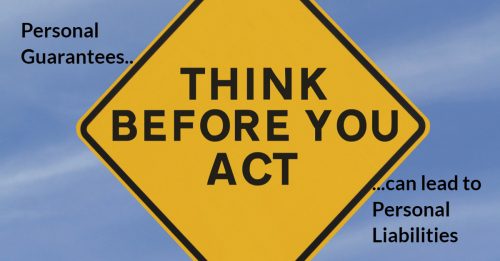Personal Guarantees, Insolvency and Personal Liability
In recent months we have seen an increase in directors asking what their exposure is to claims under Personal Guarantees and how they should respond to such claims.
In this article, Clive Fortis, Director at our Bournemouth office, looks at what Personal Guarantees are, what can happen if the terms of the Personal Guarantee are not met and what options a company Director who has given a Personal Guarantee has available to them. This is important if facing insolvency as a Personal Guarantee can involve a director’s personal finances.
What is a Personal Guarantee? How do They Work?
Personal Guarantees are (in theory) simple, and it is no surprise that lenders are so reliant upon them. In practice, the Guarantor (often a company Director) legally agrees to be personally liable for the company’s debts – which can include commercial business loans, invoice finance, bank overdrafts and commercial rent payments.
If the company is unable to pay the debt and thus fulfil its obligations to the lender, the lender can then sidestep any formal insolvency process the company may enter (as well as limited liability protection) and look to recover the debt from the Guarantor personally, by calling in the Personal Guarantee.
What are the Risks Associated with Personal Guarantees?
Clive comments:
“The risks associated with personally guaranteeing large company loans can result in serious consequences for the Guarantor, including significant equity decreases in the family home (which might even need to be sold) or, in the most severe cases, bankruptcy. So it’s important to take advice quickly.”
How can Insolvency Practitioners Help?
Whenever a company is in considerable financial difficulty, and is struggling to pay its debts, the directors should seek help from a licensed insolvency practitioner. We will provide detailed and expert advice as to the best course of action.
If all, or some of the company’s debts are secured by a personal guarantee, the director(s) are liable to repay the debt and it is likely that creditors will try and call on the guarantee. That’s where we come in – we will work towards a solution that all parties can accept.
Perhaps the most important thing Insolvency Practitioners can do is try and ensure that the guarantee is not called in and that means seeing if we can we find a way to save the business. Two options could be either a Company Voluntary Arrangement or a Company Administration. If, however, the company is not viable and cannot be saved the option may be to go into liquidation.
Clive continues:
“If liquidation is the chosen option, we can then help directors talk to the creditor who has insisted on calling in the guarantee and try and come to some sort of negotiated settlement.”
There are 3 main options available to insolvent companies:
A Company Voluntary Arrangement (CVA)
CVAs are formal debt repayment arrangements that consolidate a company’s unsecured debts into affordable, monthly instalments, tailored to what the company can afford. These arrangements usually last five years, and once concluded, any remaining unsecured debt is written off.
Company Administration
In Administration, more substantial restructuring is required to alleviate the company’s insolvency. A licensed insolvency practitioner takes control of the company and makes the necessary changes to make it appealing to potential buyers. The process protects the company from creditor pressure and legal action for the duration of the procedure.
Closing a company using a Creditors Voluntary Liquidation
If a CVA or an Administration is not feasible because the debts simply too big to save the company, then the directors can close the company in a structured, orderly manner by using a Creditors Voluntary Liquidation (CVL). Closing through this arrangement draws a line under the insolvent company, allows employees to claim redundancy pay, and gives the directors the opportunity to start afresh. Doing so is often preferable to waiting for creditors to wind-up the company through compulsory liquidation, over which the directors have little control.
Talk to us if facing insolvency
If your company is struggling to pay its debts and is facing insolvency, the sooner you talk to us the better, especially if a Personal Guarantee is involved. If the Personal Guarantee has been properly legally drafted, then the only options are: to take action to put things right before the Guarantee is called in; come to an agreement to pay it, or in the worst case go bankrupt. As always, the sooner action is taken the more options there are available.
Please contact us or call our Bournemouth office, for a FREE initial discussion on the ‘phone or over a coffee.
Bournemouth: 01202 923009
